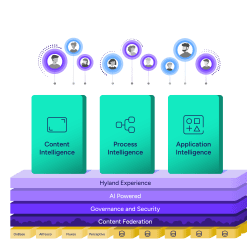Pitney Bowes
Technology company drives business transformation with a new platform for digital products.

Harness the power of a unified content, process and application intelligence platform to unlock the value of enterprise content.
Learn more
Explore Hyland’s solutions by industry, department or the service you need.
Overview of solutionsIt's your unique digital evolution … but you don't have to face it alone. We understand the landscape of your industry and the unique needs of the people you serve.
 Overview of industries
Overview of industries
Countless teams and departments have transformed the way they work in accounting, HR, legal and more with Hyland solutions.
 Overview of departments
Overview of departments
We are committed to helping you maximize your technology investment so you can best serve your customers.
 Overview of services
Overview of services

Discover why Hyland is trusted by thousands of organizations worldwide.
Hear from our customers
Our exclusive partner programs combine our strengths with yours to create better experiences through content services.
Overview of partners
Find resources to power your organization's digital transformation.
Browse the resource center
Hyland connects your content and systems so you can forge stronger connections with the people who matter most.
Learn about HylandWith our modern, open and cloud-native platforms, you can build strong connections and keep evolving.
 Dig deeper
Dig deeper
Reading time minutes
Technology company drives business transformation with a new platform for digital products.

Founded in 1920, Pitney Bowes is the company behind the iconic office postage meter. Now, the company is undertaking a multi-year digital transformation to move from the 20th-century mailroom to the center of modern commerce. To maintain its leadership in a highly disrupted market, the company has reinvented itself as a technology innovator and embraced platform thinking.
At the heart of the company’s digital transformation is the Pitney Bowes Commerce Cloud. According to Kyle Pause, Director of Software Engineering at Pitney Bowes, “the Commerce Cloud is the platform for our second century. It supports a completely transformative shift in how we do business.”
The Commerce Cloud integrates core enabling technologies — like SaaS, mobile, Big Data, and IoT — to deliver innovative shipping, mailing and digital commerce solutions for Pitney Bowes’ 1,000,000+ clients. The platform provides Pitney Bowes simply a better way to accelerate product delivery, broaden its partner ecosystem, and increase customer value with new digital services and experiences.
Hyland's Alfresco Process Services (APS) is among the many technologies embedded in the Commerce Cloud. Pitney Bowes uses the open Business Process Management (BPM) solution to onboard new clients to its digital solutions — whether that’s setting up a new SaaS subscriber or registering a developer for API access.
When a client signs up for a Commerce Cloud offering, APS orchestrates the flow of new account information across multiple business systems, including Salesforce, SAP and Ariba. “Alfresco Process Services has played a critical role in helping us with that BPM challenge,” says Pause. “We’ve been able to deliver a seamless, real-time onboarding experience that customers expect today.”
— Kyle Pause, Director of Software Engineering at Pitney Bowes
Alfresco-platform-driven provisioning flows have significantly accelerated client onboarding, which is important given Pitney Bowes aggressive growth goals for the Commerce Cloud. “It’s made those flows much more efficient than they’ve been in the past,” says Pause.
For example, the company slashed the onboarding time for a postage payment product offered by Pitney Bowes Global Financial Services from three days to five seconds. New clients can start running mail almost immediately after signing up for an account. Behind the scenes, APS coordinates a provisioning flow that launches credit checks, sets up a payment account, generates a payment token and then puts the token in all the right places in all the right systems.
APS is part of the cloud-enabled SaaS services layer of the Commerce Cloud, which allows Pitney Bowes’ product teams to leverage the power of the company’s business systems. The provisioning flow is called with an API. This architectural approach makes it easy for new Commerce Cloud offerings to plug into a pre-built process without requiring in-depth knowledge of provisioning or backend applications. As a result, the business can accelerate both onboarding and time to market.
Pitney Bowes runs APS on AWS. “The combination of Alfresco Process Services and AWS has been very successful for us,” says Pause. “We’ve been able to run very efficiently and cost-effectively with tremendous uptime and SLA performance.”
Thinking back on its initial implementation, Pause calls the time to value using APS “just incredible.” Pitney Bowes staffed up an offshore development team to build out the provisioning flow. “Five months later, it was running in production for probably the most significant launch that Pitney Bowes has done in more than a decade,” he says.
Looking ahead, Pause envisions using analytics and machine learning to better understand and resolve the exceptions that arise during client onboarding — possibly by leveraging the Alfresco Application Development Framework. If it could “modify the flow in an ongoing basis so we don’t need manual interventions, that would just be incredible for us,” notes Pause.
Pitney Bowes has made significant progress growing its digital commerce capabilities. New solutions powered by the Commerce Cloud include SaaS-based apps for shipping and mailing, data sets to enrich geospatial software, a portfolio of public APIs and IoT-enabled postage meters that use telemetry data to save customers money and time.
Pitney Bowes is also opening up the Commerce Cloud platform to external partners. In a move to accelerate innovation and enhance client value, the company launched the Small Business Partner Program, which allows third parties to build and sell applications that leverage the Commerce Cloud and its capabilities. Pause predicts the program will have a network effect as external developers deliver creative new solutions on the Pitney Bowes platform.
Pause says the company’s digital transformation has involved a lot of hard work, but in many ways he “can’t believe how fast we’ve been able to go.” Pause claims a key success factor has been “finding the right partners who can give us a leg up. In the cloud, that’s partnering with AWS; in process automation, that’s partnering with Alfresco; and in APIs, that’s partnering with Apigee and Google.”
Pitney Bowes’ reinvention has already delivered positive results. “This digital transformation has helped put us on a growth trajectory and we are really excited about that,” Pause concludes.